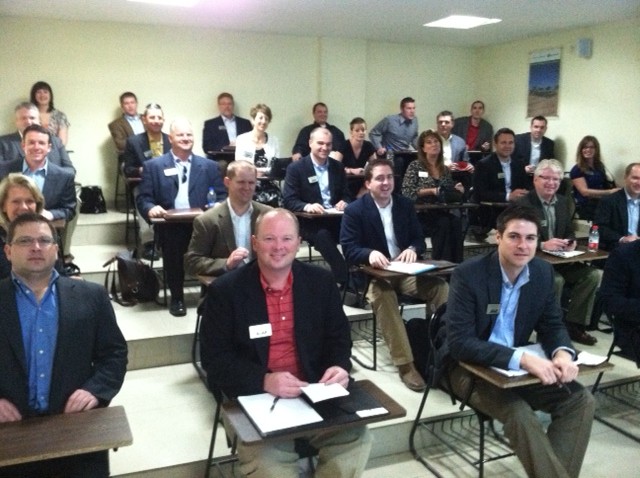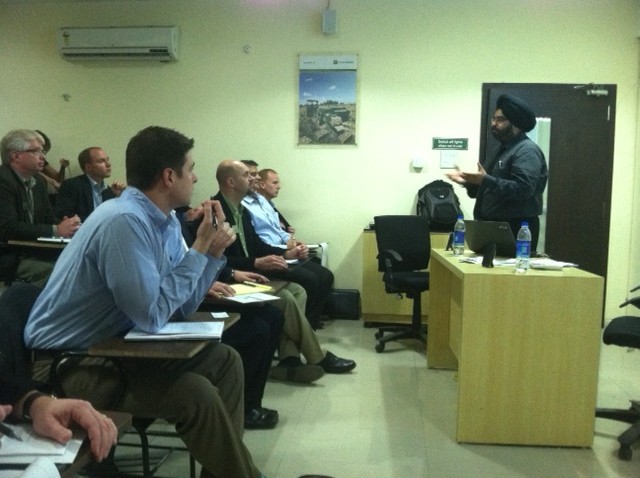As a change of pace today, we did not travel very far, only taking a 30 minute shuttle from our hotel to the John Deere Training Center. We learned about John Deere’s role in the Indian machinery market, hosted by Ramakant Garg and Mukul Varshney. Mukul was very enthused to meet with us, actually citing that he met with the Class of 2004 on March 6, 2004. John  Deere has had a presence in India since 1997 and has a goal of modernizing Indian Agriculture. They mentioned India has the most acreage of three major crops; rice, wheat, and cotton, yet they are second in production for these three crops. Furthermore Mukul stated, “You would think we were large exporters…No, yields are lagging. When it comes to yield we are far below world average.” John Deere views this as an opportunity. Regarding John Deere’s production in India, in 2011 they produced 64,000 tractors, which is more than they do in any other country, including the U.S. Their production in India is cost effective, but low cost does not mean low quality as they have exported to 67 countries.
Deere has had a presence in India since 1997 and has a goal of modernizing Indian Agriculture. They mentioned India has the most acreage of three major crops; rice, wheat, and cotton, yet they are second in production for these three crops. Furthermore Mukul stated, “You would think we were large exporters…No, yields are lagging. When it comes to yield we are far below world average.” John Deere views this as an opportunity. Regarding John Deere’s production in India, in 2011 they produced 64,000 tractors, which is more than they do in any other country, including the U.S. Their production in India is cost effective, but low cost does not mean low quality as they have exported to 67 countries.
 The John Deere Pune Training Center is one of four Training Centers in India. These Training Centers are designed to train new employees and dealers on the product line. These facilities are prepared to provide training in one of the 17 languages needed according to the location of the dealership. They can provide training such as on-line modules, classroom settings, as well hands on training with cutaway motors, drivetrains, and complete units.
The John Deere Pune Training Center is one of four Training Centers in India. These Training Centers are designed to train new employees and dealers on the product line. These facilities are prepared to provide training in one of the 17 languages needed according to the location of the dealership. They can provide training such as on-line modules, classroom settings, as well hands on training with cutaway motors, drivetrains, and complete units.
Our next presenters, Gyanendra Shukla and Dr. Ranga Rao were from Monsanto and discussed challenges facing the Indian farmer as well as their introduction of Bollgard Cotton to the country. They commented how India’s reluctance to accept Biotech crops for food consumption stems from their E uropean influence. Monsanto has optimism regarding the challenges facing agriculture in India, stating “We have no where to go but up!” Agriculture is at the heart of India’s greatest challenges; hunger, the environment, and poverty. The quick adoption of Bollgard Cotton has helped 87% of cotton farmers reduce their pesticide applications and increase their yields and quality of life. As a large part of India is vegetarian, lacking Omega 3 in their diet is concern. Shukla sees this as a great fit down the road for this Biotech Trait in soybeans. This however, is dependent on the Indian acceptance of Biotech crops for food consumption.
uropean influence. Monsanto has optimism regarding the challenges facing agriculture in India, stating “We have no where to go but up!” Agriculture is at the heart of India’s greatest challenges; hunger, the environment, and poverty. The quick adoption of Bollgard Cotton has helped 87% of cotton farmers reduce their pesticide applications and increase their yields and quality of life. As a large part of India is vegetarian, lacking Omega 3 in their diet is concern. Shukla sees this as a great fit down the road for this Biotech Trait in soybeans. This however, is dependent on the Indian acceptance of Biotech crops for food consumption.
 Harshdeep Singh of Tata Corporation’s Chemical Division then enlightened our group with the diversity of his corporation. Tata is the largest business of India and exports products to 85 countries. They are involved in the following industries; communications, raw materials, manufacturing, as well as others. The company has enjoyed continued success based on their founder Jamsetji Tata’s philosophy, “Money from society must return to society.” As to their Chemical Division he mentioned how they have a Farmer First mentality. One example of this is how they premix fertilizers so that farmers need only buy one bag that contains N-P-K and Micronutrients. The net result is farmers are no longer over applying fertilizers as they had in the past, helping the environment and increasing their bottom line. Singh also talked of their Win-Win Partnership Model that they have formed with store owners to sell their products. In this they supply existing store owners with their fertilizers instead of opening new stores. This has allowed for existing relationships and distribution networks to remain in place.
Harshdeep Singh of Tata Corporation’s Chemical Division then enlightened our group with the diversity of his corporation. Tata is the largest business of India and exports products to 85 countries. They are involved in the following industries; communications, raw materials, manufacturing, as well as others. The company has enjoyed continued success based on their founder Jamsetji Tata’s philosophy, “Money from society must return to society.” As to their Chemical Division he mentioned how they have a Farmer First mentality. One example of this is how they premix fertilizers so that farmers need only buy one bag that contains N-P-K and Micronutrients. The net result is farmers are no longer over applying fertilizers as they had in the past, helping the environment and increasing their bottom line. Singh also talked of their Win-Win Partnership Model that they have formed with store owners to sell their products. In this they supply existing store owners with their fertilizers instead of opening new stores. This has allowed for existing relationships and distribution networks to remain in place.
In the evening, the class was treated to the “John Deere Leadership Dinner” at the rooftop restaurant of the Hyatt Regency Pune where we are staying. It was great to interact with these Executives of John Deere in a social setting. The meal was absolutely amazing and the conversations help us build relationships into the future.
No responses yet